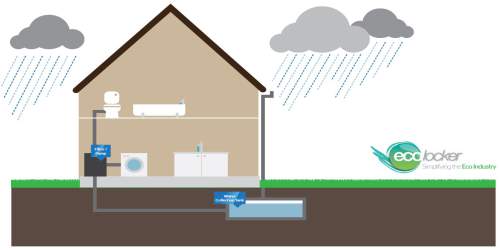Read Time : 4 Minutes
Benefits of Rainwater Collection
There’s no doubt that making the most of the resources we have can also make a big difference to our plans for a more sustainable future. The truth is that many of us have taken our water supply for granted, expecting it to be delivered straight to our doors without much thought to how much we use or how we can be more economical.
After all, 70% of our world is covered in water. We have lakes and reservoirs that provide us with good, clean water and it gets replenished on a regular basis when it simply rains. Unfortunately, only 1% of water is drinkable and we live with the prospect of an ever growing population that all want their share. The research actually suggests that by 2030 demand will far outstrip supply.
The Ecological Benefits of Rainwater Harvesting
The ecological benefits of recycling rainwater are potentially huge: toilet flushing, for example accounts for up to 35% of the average household’s water usage. Add in the amount of water we use for washing clothes or watering the garden and the possible savings begin to grow.
For businesses these figures are much higher, particularly for industries such as hotels that have a large number of regular guests in one place. Using rainwater harvesting for jobs such as flushing the toilet eliminates the need to use fresh drinking water from the mains and offers a significant reduction in the total water usage.
The main ecological benefit offered by the use of rainwater collection systems is the reduction in this use of mains water which means that less water will need to be artificially drawn from the environment, a supply that is best used for drinking, bathing and cooking. One of the other ecological benefits of rainwater harvesting systems is that they can lessen the load placed upon drainage systems, reducing the effects of flooding by channelling the run-off water into tanks for recycling.
COMPARE PRICES FROM LOCAL INSTALLERS
Compare prices from local companies fast & free
Enter your postcode to compare quotes from leading professionals. We promise to keep your information Safe & Secure. Privacy Policy
Financial benefits of Rainwater Collection
It is important to note that only those properties fitted with a water meter will benefit financially from rainwater collection systems. Those who do not have a meter and pay a flat rate for water will not see much in the way of financial return, as the amount of drinking water saved will make no difference to the eventual bill (though the ecological effect is still sizeable).
More and more people are starting to turn to a metered water provision, even if they have a large family. Being on a meter can save a large amount if your initial water usage is low (in some cases halving the bill) but it can also prompt you to be more conscious of recycling and not taking this valuable asset for granted.
How much a rainwater harvesting system will save you in the long run will depend on a number of factors such as water consumption habits both indoors and outdoors, meteorological factors, as well as the size and initial cost of the system installed. It is nonetheless possible to give a rough estimate on the potential bill savings available to those with water meters.
In the case of a domestic system, it may be that you could save 40-50% on water bills by drawing the water you need for washing clothes and cleaning your car from a reserve tank. It is important to remember that rainwater recycling will never completely replace a mains water supply, as clean drinking water will still be needed for drinking, food preparation and personal bathing, and a system needs to be incorporated in to override the rainwater harvesting tank if it runs dry for any reason.
Find out about the cost of rainwater harvesting.
Other Benefits of Rainwater Harvesting
Rainwater harvesting systems are relatively easy to maintain because they are not used for drinking water and don’t require the installation of any expensive purifying technology and monitoring. For most buildings there is a built in catchment area, the roof, which during a rain storm is capable of collecting a large amount of water. Because this is collected efficiently it also reduces the impact of problems such as soil erosion and flood reduction surrounding the property, especially in highly populated, urban areas.
Is a rainwater harvesting system worth it?
The Disadvantages of Rainwater Harvesting
- Of course, one of the problems is that if it doesn’t rain then you don’t get your tank filled which is why you need to install a system where the mains cuts in when there are problems with the supply.
- The initial cost of the system and its installation means there may not be a return on investment for a number of years. If you are having an underground tank installed then there are more costs for the survey and excavation as well as possible planning permission.
Overall, the advantages of rainwater harvesting far outweigh any disadvantages. The primary reason for introducing it is the reduction in water costs and lowering the impact we all have on the environment. It may well be that in the near future all new builds will have their own rainwater harvesting systems, as well as other green technologies, that reduce the pressure on the main supply. Find out more about the different types of rainwater harvesting.
In conclusion
Rainwater harvesting offers a multitude of benefits that make it a sustainable and environmentally-friendly solution for water management. This ancient practice, revitalized and enhanced by modern technologies, holds significant potential to address the challenges posed by water scarcity and climate change.
Firstly, rainwater harvesting helps to alleviate the strain on traditional water resources, such as groundwater and surface water reservoirs. By capturing rainwater from rooftops, catchment areas, and other surfaces, we reduce the demand on these conventional sources, allowing them to replenish and maintain their ecological balance.
Secondly, rainwater harvesting fosters self-sufficiency and resilience in communities, particularly in regions prone to droughts or facing water stress. By creating decentralized water supply systems, individuals and communities can rely on a local and sustainable water source, independent of centralized utilities. This promotes community empowerment and reduces vulnerability to water shortages during periods of low rainfall or emergencies.
Moreover, rainwater harvesting has a significant impact on water quality improvement. As rainwater is naturally soft and free from contaminants like salts and minerals, it provides a cleaner source of water for various non-potable uses. With proper filtration and treatment, rainwater can be made safe for drinking purposes, especially in areas where access to clean water is limited.
The ecological benefits of rainwater harvesting are also profound. By reducing stormwater runoff, it helps mitigate flooding, erosion, and water pollution, preserving local ecosystems and protecting aquatic life. It promotes groundwater recharge, thus maintaining water levels in wells and underground aquifers, which, in turn, sustains vegetation and supports biodiversity.
On a broader scale, rainwater harvesting contributes to global efforts in mitigating climate change. By encouraging water conservation and reducing energy-intensive water treatment processes, it indirectly reduces greenhouse gas emissions. Additionally, as rainwater harvesting is inherently energy-efficient, it aligns with sustainability goals, fostering a greener and cleaner future.
Lastly, rainwater harvesting offers economic advantages as well. By reducing dependence on costly water infrastructure projects and imported water supplies, it can result in cost savings for both governments and individuals. Furthermore, the excess harvested water can be used for irrigation, thus benefiting agriculture and promoting food security.
In conclusion, rainwater harvesting presents a holistic approach to water management, encompassing environmental, social, and economic benefits. Its widespread adoption can play a crucial role in safeguarding our precious water resources, mitigating the effects of climate change, and building resilient communities for a sustainable future. As individuals, communities, and governments join hands to embrace rainwater harvesting, we take a significant step towards a more water-secure and ecologically balanced planet.
Find a local installer
Welcome to the biggest directory of UK renewable energy companies





 Types of Rainwater Harvesting System
Types of Rainwater Harvesting System


